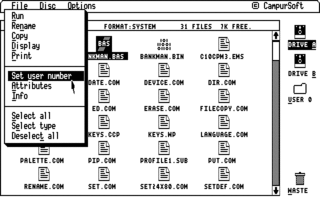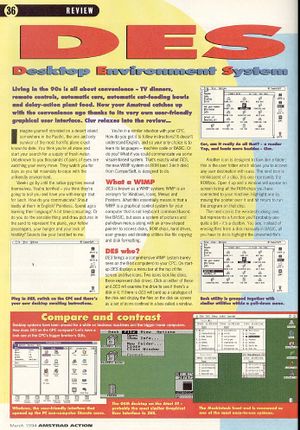Desktop Environment System (shortened to DES) is a graphical user interface (GUI) for the Amstrad CPC which was programmed by Michael Beckett and released by Campursoft on both disc and ROM. The disc version cost £14.99, and the ROM version cost £24.99. The ROM version occupied two ROMs and booted directly into the GUI environment, bypassing the BASIC command line entirely (although this could be prevented by holding down the SPACE bar).
The aim of DES was to realise a system that was similar to graphical user interfaces for other computers, such as GEOS on the C64, Microsoft Windows for PCs, and Mac OS for the Apple Macintosh. Applications could be started from a desktop and used the GUI library of DES. Control of the cursor was performed through a mouse (such as the AMX Mouse), a joystick, or the keyboard (using the cursor keys).
Applications
Unlike the many other graphical user interfaces for the CPC that had been released previously, DES allowed programmers to write their own applications, thanks to the built-in library of routines (which were accessed in a similar way to the CPC's own firmware routines). Campursoft hoped that if external DES applications were programmed, then DES would become more popular. However, only a few applications were ever released:
- CPC Disc Editor (Michael Beckett)
- DES Camera Utility (Michael Beckett) - a utility to grab and save screenshots from within DES
- Desktop Organise (Richard Fairhurst)
- DES Tape Archiver (Michael Beckett)
- DesText (Richard Wildey) - a front-end for Arnor's Protext word processor
- Directory Printer (Richard Wildey)
Reviews
- Clur Hodgson reviewed DES in the March 1994 issue of Amstrad Action (issue 102), giving it an overall rating of 84%.
- Richard Fairhurst reviewed DES in issue 1 of Better than Life, giving it an overall rating of 75%.
Manuals
- DES User Manual (pdf)
- DES Programmer's Guide (pdf) (scanned version)
- DES Programmer's Guide (pdf) (OCRed version from Kevin Thacker)
Screen shots
Download
DES ROMs on a HFE image for easy transfer
DES apps, including the Protext ROM, in both DSK (provided by Terje) and HFE format.












